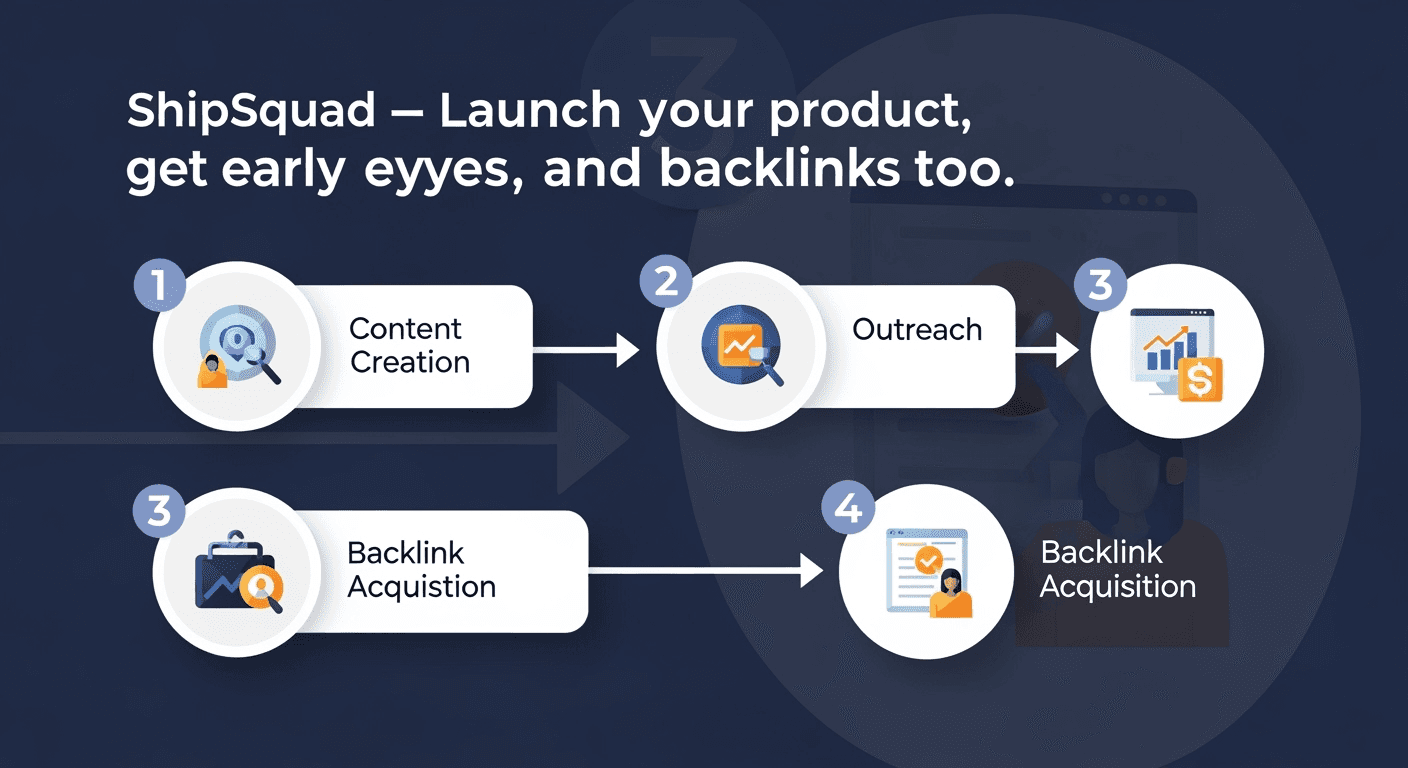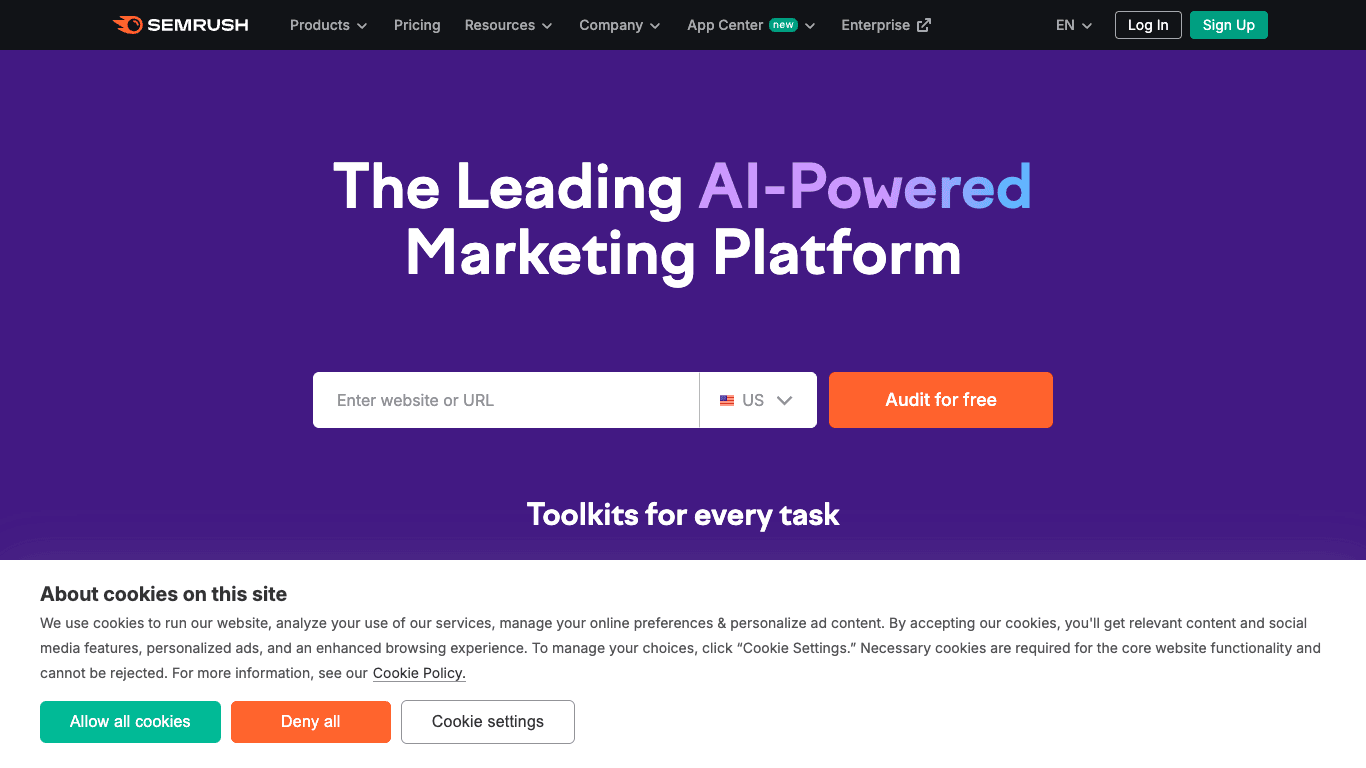The Ultimate Guide to Guest Posting for Backlinks in 2025
guest posting for backlinks: You’ve built an incredible product. You’ve poured your heart, soul, and countless late nights into it. Now comes the hard p — learn

You’ve built an incredible product. You’ve poured your heart, soul, and countless late nights into it. Now comes the hard part: getting people to notice. If you're launching a new product, especially your first one, you know the struggle. You need visibility, you need users, and you need to build credibility—fast. This is where the magic of guest posting for backlinks comes in, a time-tested strategy that’s more powerful than ever.
Think of it as borrowing someone else's microphone. Instead of shouting into the void on your brand-new blog, you get to share your expertise on an established stage, in front of a ready-made audience. And the best part? You get a valuable "vote of confidence" back to your site in the form of a backlink.
This guide will walk you through everything you need to know about guest posting for backlinks. We'll cover how to find the right opportunities, craft the perfect pitch, and write content that not only earns you a link but also drives real, engaged traffic to your new product.
Table of Contents
- Why Guest Posting for Backlinks is a Game-Changer for New Products
- The Step-by-Step Playbook for a Winning Guest Post Campaign
- Step 1: Finding Your Perfect Guest Post Targets
- Step 2: Crafting a Pitch That Editors Can't Ignore
- Step 3: Writing an Unforgettable Guest Post
- Step 4: Beyond the Backlink: Building Real Relationships
- Streamlining Your Launch: A Look at Guest Posting & Launch Platforms
- Real-World Wins: Mini Case Studies in Guest Posting Success
- Top Mistakes to Avoid in Your Guest Posting Journey
- Conclusion: Your Next Steps to Backlink Success
- Frequently Asked Questions (FAQs)
Why Guest Posting for Backlinks is a Game-Changer for New Products
Let's be clear: guest posting isn't just about SEO. While the backlinks are a huge part of the appeal—and crucial for telling search engines your site is legit—the benefits run much deeper.
- Boost Your SEO and Domain Authority: This is the big one. High-quality backlinks are a massive ranking factor for search engines. When an authoritative site links to you, it’s like a vote of confidence, boosting your own site's credibility and helping you rank higher in search results. Recent data shows that websites with higher domain authority consistently have a larger number of quality backlinks.
- Instant Exposure to a Targeted Audience: Why build an audience from scratch when you can tap into an existing one? A guest post puts your brand, your story, and your product in front of thousands of potential customers who are already interested in your niche.
- Build Authority and Credibility: Publishing content on a respected industry blog instantly positions you as an expert. It shows that you know your stuff and that other leaders in the space trust your insights. For a new product, this borrowed credibility is priceless.
- Drive High-Quality Referral Traffic: People who read your guest post and click through to your site are not just random visitors. They are highly interested and engaged. This referral traffic is often much more likely to convert into early adopters and paying customers. In fact, some studies show guest posts can generate a significant boost in referral traffic.
For an indie maker or an early-stage founder, guest posting for backlinks is one of the most cost-effective marketing strategies you can deploy. It requires sweat equity more than a big budget.
The Step-by-Step Playbook for a Winning Guest Post Campaign
Alright, so you're sold on the idea. But where do you even start? It can feel like a huge mountain to climb. Don't worry, I've got your back. Here’s a simple, step-by-step process I'd tell a friend to follow.
Step 1: Finding Your Perfect Guest Post Targets
Not all blogs are created equal. The key is to find sites that are relevant to your niche and have an engaged audience. Pitching a tech product on a food blog is a waste of everyone's time.
Here are a few proven ways to find the right opportunities:
- Good Old-Fashioned Google Search: This is the easiest place to start. Use search queries like:
"[your niche]" + "write for us""[your topic]" + "guest post guidelines""[your industry]" + "become a contributor"
- Analyze Your Competitors: See where your competitors are getting their backlinks. Tools like Ahrefs (https://ahrefs.com) or SEMrush (https://www.semrush.com) can show you who is linking to them. Many of these will be from guest posts you can target too.


- Social Media Searches: Search on Twitter or LinkedIn for hashtags like #guestpost or #writeforus. You’d be surprised how many editors and content managers post opportunities there.
Once you have a list, do a quick quality check. Look for sites with good domain authority (you can use the MozBar browser extension for this), an active comments section, and a strong social media presence. These are all signs of a healthy, engaged community.
Step 2: Crafting a Pitch That Editors Can't Ignore
Editors at popular blogs get dozens, if not hundreds, of pitches every day. Most of them are generic, poorly written, and get deleted instantly. Your pitch needs to stand out.
Here’s a simple formula for an effective outreach email:
- Personalize, Personalize, Personalize: Address the editor by their name. Mention a recent article they published that you enjoyed. Show them you've actually read their blog and aren't just spamming a list.
- Establish Your Credibility (Briefly): Who are you and why should they listen to you? Mention your product, your expertise, or link to a couple of other articles you've written.
- Pitch Your Ideas: Don't just say "I'd like to write for you." Come prepared with 2-3 specific, compelling headline ideas that you know would resonate with their audience. Make sure these topics haven't been covered on their blog recently.
- Keep it Short and Sweet: Respect their time. Your email should be concise and easy to scan.
Think of it this way: you're not asking for a favor. You're offering them high-quality, valuable content for their audience, for free. Frame your pitch that way.
Step 3: Writing an Unforgettable Guest Post
Congratulations, your pitch was accepted! Now the real work begins. Your goal isn't just to get a backlink; it's to provide so much value that readers are compelled to learn more about you.
- Follow the Guidelines: This is non-negotiable. Every blog has its own rules for formatting, word count, and linking. Follow them to the letter.
- Write Your Best Stuff: Don't hold back. Pour your best insights and advice into the post. Make it actionable, insightful, and engaging. The golden rule is to write something you'd be proud to publish on your own site.
- Incorporate Your Backlink Naturally: Your backlink should feel like a natural part of the content, not a forced advertisement. A great way to do this is to link to a relevant blog post, case study, or resource on your own site that adds more value to the topic. Don't just link to your homepage.
- Include a Compelling Author Bio: Your bio is your final chance to shine. Briefly introduce yourself and your product, and include a clear call-to-action. This is often the best place for a direct link to your product's landing page.
Step 4: Beyond the Backlink: Building Real Relationships
The biggest mistake people make with guest posting for backlinks is treating it as a one-and-done transaction. The real power comes from building long-term relationships.
After your post is published:
- Promote it: Share the article with your own social media audience and email list. This drives more traffic to the host blog, which they will definitely appreciate.
- Engage in the Comments: Stick around to answer questions and respond to comments on your post. This shows both the editor and the audience that you're engaged and care about the community.
- Stay in Touch: Send a thank-you email to the editor. Keep the relationship warm by occasionally sharing their other articles or commenting on their social media posts. This can lead to more guest posting opportunities down the line.
Streamlining Your Launch: A Look at Guest Posting & Launch Platforms
The traditional guest posting outreach process can be a grind. For indie builders focused on their product, finding the time for prospecting, pitching, and writing can be tough. This is where launch platforms come in, but they're not all created equal. Many charge fees, require you to have an existing audience, or don't offer any real SEO benefits.
This is a problem we're passionate about solving. What if there was a way to get early feedback, visibility, and valuable backlinks, all in one place, for free?
That's the idea behind ShipSquad (shipsquad.space). It's a platform designed specifically for indie makers and early-stage founders who need to get their products in front of early adopters while simultaneously building their SEO foundation. It’s a community where you can launch, get discovered, and earn those crucial initial backlinks without the hassle.
Let's compare a few approaches:
| Feature | Traditional Guest Posting | Typical Launch Platforms | ShipSquad (shipsquad.space) |
|---|---|---|---|
| Primary Goal | Backlinks & Authority | Initial Buzz & Traffic | Visibility, Feedback & Backlinks |
| Cost | Free (Time-Intensive) | Often Freemium or Paid | Completely Free |
| SEO Benefit | High (Direct Backlinks) | Varies (Often NoFollow or No Links) | High (Quality Backlinks from a Relevant Platform) |
| Effort Required | High (Manual Outreach) | Low to Medium | Low (Simple Product Submission) |
| Audience | Taps into existing blog audiences | Platform-specific users | Community of Early Adopters & Indie Builders |
Featured Solution: For founders in their first product launch phase, ShipSquad offers a unique advantage. It combines the discoverability of a launch platform with the SEO power of guest posting for backlinks. You get your product in front of the right people and build your site's authority from day one, solving two of the biggest launch-day hurdles simultaneously.
Real-World Wins: Mini Case Studies in Guest Posting Success
Theory is great, but results are better. Let's look at how this works in the real world.
Case Study 1: The SaaS Startup That Tripled Its Traffic
An outdoor affiliate website was getting decent traffic but wanted to scale. They embarked on a focused six-month guest posting campaign. By identifying relevant, high-authority blogs in the outdoor and camping niche, they were able to secure around 60 high-quality backlinks.
- The Challenge: Increase organic traffic and build domain authority for a competitive niche.
- The Solution: A strategic guest posting for backlinks campaign targeting relevant outdoor lifestyle blogs.
- The Results: In just six months, their monthly organic traffic skyrocketed from ~63,000 to over 167,000. This demonstrates the direct impact that consistent, high-quality guest posting can have on organic growth.
Case Study 2: The Indie Maker Who Found Her First 100 Users
Imagine a solo founder, "Jane," who just launched a new productivity app. She had zero marketing budget and a brand-new website with no authority. Instead of paying for ads, she spent a month focused on guest posting. She identified five key blogs that her target audience of busy professionals read religiously. She wrote in-depth articles on productivity hacks, naturally weaving in how her app solved a specific problem.
- The Challenge: Get initial users and product validation with no budget.
- The Solution: Targeted guest posting for backlinks on niche productivity blogs.
- The Results: From those five guest posts, she not only got valuable backlinks but also drove over 1,000 targeted visitors to her site, resulting in her first 100 paying customers. The feedback from these early adopters was crucial in refining her product.
These examples show that whether your goal is massive traffic growth or acquiring your very first users, guest posting for backlinks is a powerful and versatile tool.
Top Mistakes to Avoid in Your Guest Posting Journey
While guest posting is incredibly effective, it's also easy to get wrong. Here are some common pitfalls that can kill your campaign before it even starts:
- Sending Generic, Robotic Pitches: Editors can spot a copy-pasted template from a mile away. Always personalize your outreach.
- Focusing Only on Links: If your article reads like a thinly veiled advertisement, it will get rejected. Your primary focus should be on providing value to the reader. The link is the byproduct of great content.
- Ignoring the Host Blog's Audience: Writing a post that doesn't align with the blog's style or the audience's interests is a recipe for failure.
- Submitting Low-Quality Content: Don't treat a guest post as less important than content for your own site. It's a reflection of your brand, so make it your best work.
- Forgetting to Promote: Hitting "publish" isn't the end. Forgetting to promote the post and engage with readers is a huge missed opportunity.
Recommended Videos

- How to Write a Guest Post Pitch That Gets Accepted - Actionable tips specifically on crafting the perfect outreach email.
Conclusion: Your Next Steps to Backlink Success
Launching a new product is tough. You're competing for attention in a crowded market, and building credibility from scratch can feel impossible. But guest posting for backlinks offers a clear, actionable path forward.
It’s more than just an SEO tactic. It’s a way to build your brand, connect with new audiences, establish your authority, and drive meaningful traffic that converts. It’s about building relationships and providing real value.
And while the traditional path of manual outreach is powerful, it's not the only way. For indie makers and early-stage founders looking to get early eyes, validation, and SEO growth without the extra costs, a platform like ShipSquad (shipsquad.space) can be a massive accelerator. It removes the friction from the process, letting you focus on building a great product while your online presence grows automatically.
So, what are you waiting for? Start identifying your target blogs, craft a personalized pitch, and share your expertise with the world. Your first—and next—group of loyal customers are out there waiting to hear from you.
Frequently Asked Questions (FAQs)
1. Is guest posting for backlinks still effective in 2025?
Absolutely. While search engine algorithms are always changing, the value of high-quality, relevant backlinks from authoritative sites remains a cornerstone of SEO. The key is to focus on creating genuinely helpful content rather than just trying to build links.
2. How many guest posts do I need to write to see results?
There's no magic number. Consistency is more important than volume. A single, high-quality guest post on a top-tier blog can be more impactful than ten posts on low-quality sites. Start with a manageable goal, like one or two guest posts per month, and focus on quality over quantity.
3. Should I pay for guest posting opportunities?
Generally, you should avoid sites that openly charge for guest posts. Google frowns upon paid links that aren't marked as sponsored, and these sites are often low-quality "link farms." True guest posting is about an exchange of value: your great content for their audience and a backlink.
4. What's the difference between a "dofollow" and a "nofollow" link?
A "dofollow" link passes SEO authority (or "link juice") from the host site to yours, which directly helps your search rankings. A "nofollow" link tells search engines not to pass along that authority. While dofollow links are ideal for SEO, nofollow links from high-traffic sites can still be valuable for referral traffic and brand exposure.
5. How long should a guest post be?
This depends entirely on the host blog's guidelines. Some may prefer short, punchy articles of 800 words, while others might look for comprehensive guides of 2,000+ words. Always check the guidelines first. When in doubt, aim for content that is thorough and comprehensive.
6. How can I track the success of my guest posting efforts?
You can use tools like Google Analytics to track referral traffic from the sites where you've guest posted. To track your backlink profile and keyword ranking improvements over time, you can use SEO tools like Ahrefs, SEMrush, or Moz.